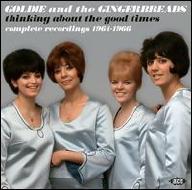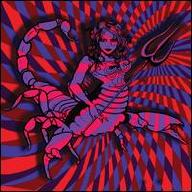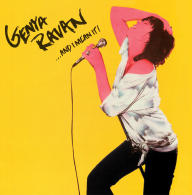Young Goldie Zelkowitz didn't know she could sing until she was in her late teens. In the summer of 1962, she asked to sing with the Escorts, who were performing at the Lollipop Lounge in Brooklyn, New York. Soon she was rehearsing with the band and became Richard Perry's first girlfriend (he was the bass vocalist in the group and the man who would go on to produce Ringo Starr, Carly Simon, Leo Sayer, the Pointer Sisters, and so many others). The Escorts recorded and released a few singles on Coral Records in 1962 and 1963: "Somewhere" b/w "Submarine Race Watching," "I Can't Be Free" b/w "One Hand, One Heart," and "Something Has Changed Him" b/w "Back Home Again."
After she left the Escorts, Zelkowitz formed Goldie the Gingerbreads, an all-female band and a daunting task in a male-dominated industry. The Gingerbreads released singles on Decca and Immediate in the U.K., with "Can't You Hear My Heart Beat," produced by Alan Price of the Animals, hitting on the British charts. (Their manager, Michael Jeffries, also worked with the Animals.) Atlantic Records founder Ahmet Ertegun signed Goldie the Gingerbreads to his Atco imprint and released their singles in the U.S. After the Gingerbreads, Zelkowitz formed the electric and brass rock group Ten Wheel Drive and took the name Genya Ravan.
A drummer named Les Demerle turned Ravan on to Bill Takas and the Brecker Brothers. She met Aram Schefrin and Mike Zager through her manager Billy Fields, and the electric and brass rock group Ten Wheel Drive was born.
Ten Wheel Drive recorded three albums for Polydor with the rhythm and horn sections changing constantly. Judy Collins' bassist Bill Takas and Buzzy Linhart/Bette Midler drummer Luther Leon Rix were members of the original Ten Wheel Drive, playing on the band's first album, Construction #1. Midler used Ten Wheel Drive's signature tune, Jerry Ragovoy 's "Stay with Me," in her movie The Rose.
After leaving Ten Wheel Drive for a solo career, Ravan had philosophical disagreements with Clive Davis at Columbia; he felt her self-titled album debut, like Ten Wheel Drive's, went in too many directions for his taste. Not content to be the new Janis Joplin, Ravan instinctively knew her value as an extraordinary vocalist and music pioneer. Her first album features the band Baby backing her, and she worked with myriad producers, though she felt more comfortable with Zager and Schefrin handling that chore. The 1972 non-album single, "Morning Glory," is a fine example of her talent at the time. It is important to note, though, that this was not Ravan's solo debut -- she had released an Island Records 45 rpm in 1966 under the name Patsy Cole. "This is a whole other story" she said. "I walked in on a session in London to do background with Dusty Springfield. When she left, the session was over. I started to play piano and sing an old song that Baby Washington the Hearts did and Chris Blackwell loved it, so he said 'Let's roll tape' and he had to give me another name, I was under contract, and that single went on to be a hit in Jamaica and I believe it got to number one. I had Spencer Davis, Georgie Fame horns, and Stevie Winwood playing on that single and used the name Patsy Cole."
Zager & Schefrin re-formed another iteration of Ten Wheel Drive and released an album in 1974 on EMI with latter-day Rascals vocalist Annie Sutton performing a Ravan co-write, "Why Am I So Easy to Leave." Meanwhile, Ravan went on to cut more solo records, the brilliant Goldie Zelkowitz (Janus Records) with the underrated Gabriel Mekler producing, and They Love Me, They Love Me Not with the late Rolling Stones producer Jimmy Miller and Stones' engineer Joe Zagarino producing. Her incredible body of work kept building albeit with no Top 40 chart recognition that songs on the albums warranted. She reunited with Miller in 1986 for the unreleased Buddy Guy tapes that also feature Nils Lofgren, Aerosmith's Joe Perry, singer Jo Jo Laine, and others. During the sessions in Warren, Rhode Island, both she and Miller got on-stage to jam with Buddy Guy while he performed an evening show at one of the city's nightclubs. It was absolutely magical. Ravan took things into her own hands and the "significant projects (are) Urban Desire and ...And I Mean It! (both on 20th Century)...because I wrote most of it and I got to produce it. (They were) also the best-sellers for me." Indeed, Ravan began producing for other acts, most notably the groundbreaking punk band Dead Boys on Sire Records, and then Ronnie Spector's Siren album for Ravan's own imprint, Polish Records, with the handle "Who Do I F*** to Get Off This Label?"
In addition to producing female artists, Ravan was one of the very first woman to produce significant male artists. Dead Boys' "Sonic Reducer" is an underground classic and one of the better-sounding albums that Sire heralded as part of the new wave rock movement. Ravan produced numerous groups, from Joy Rider, Crumbsuckers, and Certain General to Long John Baldrey, Kool the Gang, Tiny Tim, and others. Her visibility as a vocalist is at times overshadowed by the huge amount of production and industry work she took on.
In 2001, she released For Fans Only, a collection of songs recorded over the years and then available only from her website. She has been a painter and a recording artist, and at the dawn of the new millennium was busy writing a book/screenplay about her incredible life in the music industry. From major girl group and blues vocalist to pioneering record producer and performances with Steve Winwood, Dusty Springfield, Buddy Guy, Kool the Gang, and so many others, the music industry would be a different place without the vast contributions of Genya Ravan. ~ Joe Viglione, Rovi


















